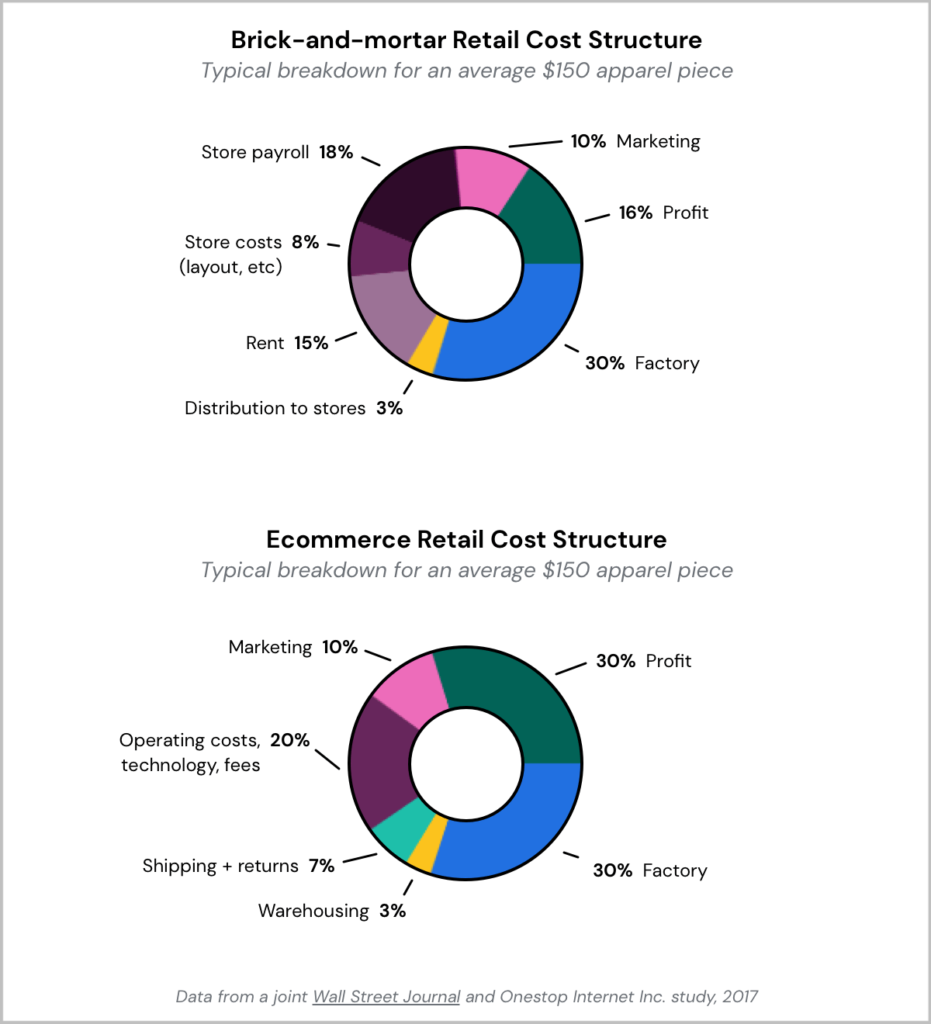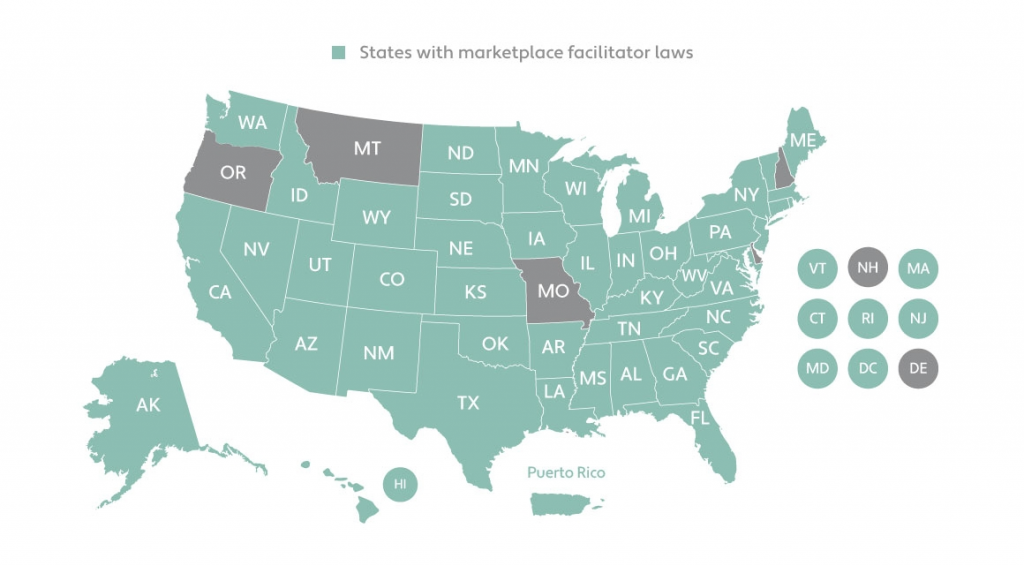Selling online either on your online store or via third-party channels enables retailers to effectively market, interact, and satisfy their consumer demands. It is an incremental process for businesses since it offers:
- Reduced transaction cost
- Ability to sell globally with minimal cross-border restrictions
- Seamless operational scalability
- More convenient for consumers.

Online Marketplace vs Ecommerce Store – Benefits And Drawbacks
While retailers have some obvious benefits of selling products/services online, the biggest conundrum he/she faces is whether to sell products on its own eCommerce store or sell on an online marketplace like Amazon or eBay. To provide a clear picture, let’s discuss both these channels with the list of benefits and individual drawbacks:
What Is An Online Marketplace?
An online marketplace is a website operated by the admin where multiple vendors list a variety of products for consumers. In simpler terms, an online marketplace could be referred to as a virtual shopping mall where the admin earns a commission for every transaction that occurs in the marketplace. Here, the seller must abide by the online marketplace rules/policies set by the admin. Amazon, eBay, Etsy are a few prime examples of online marketplaces.
Benefits Of Selling On An Online Marketplace:
Increased Business Reach – Online marketplaces accounted for nearly 62% of global retail sales in 2020, according to Digital Commerce 360’s analysis. This implies that selling on an online marketplace gives your business reach to a massive audience of shoppers both locally and globally. It even helps small retailers or brands with limited or no recognition outside their physical location, to reach a large number of potential customers that were unattainable before. For instance, Amazon – the retail giant – has more than 150 million Amazon Prime subscribers so as a seller you can advertise your products/offerings to a large volume of potential customers.
Simple and effective purchasing process – An eCommerce marketplace streamlines the entire buying process even offering order fulfillment solutions to sellers. This enables small businesses or retailers to experience unmatched scalability and efficiency. From browsing to delivery, the customer experience is inherently simplified to ensure effective online selling.
Marketplace facilitator laws – Adopted by 46 US states and Washington DC to date, the law requires marketplace facilitators like eBay or Amazon to collect and remit sales tax on behalf of all third-party sellers in the marketplace. This shifts the responsibility of managing the entire collection/payment of sales tax from a retailer to the platform itself in the US.

Drawbacks Of Selling Through Online Marketplaces:
Associated Expenses – The primary drawback of selling on an online marketplace is regular commission fees charged on individual transactions. The commission fees can be a fixed price or a set percentage (as defined by the marketplace owner/admin) and varies website by website. Commission fees is one of the primary sources of revenue for the marketplace owner. Apart from this, there are multiple charges that a seller has to pay when selling on an online marketplace that includes seller subscription fee, product listing fee, transaction fee, and other associated expenses for the marketplace seller. These expenses potentially do not outweigh the profits obtained by sellers through marketplace sales but should be keenly monitored.
Minimal relationship with customers – Establishing a strong relationship with customers helps small businesses or retailers build brand awareness online. By selling on an online marketplace, sellers compromise establishing a direct-to-consumer presence and brand awareness which they are so accustomed to at physical stores. They also lose control over the experience that their customers are having in the marketplace.
Intense Competition – There is often fierce competition in a marketplace since there are many sellers offering the same product as yours. So, the product prices are highly dynamic and need regular monitoring/readjustment to adapt to the changing consumer demand and competitor’s prices.
No Customer Data for marketing – Another biggest conundrum for an online marketplace owner is that the sellers might sell products/services directly to the consumers using external channels, bypassing their commission fee per sale. Hence, the marketplace imposes certain restrictions on sellers on direct communication with the buyers and offers no access to customer data for marketing purposes.
What Is An eCommerce Store?
An eCommerce store, on the other hand, is a website completely managed and operated by the admin (or sole vendor) itself. Here, the entire product catalog or inventory belongs to the admin targeted exclusively to the right audience with no commission cut of any kind. Any transaction in an eCommerce store involves two parties – the admin and the buyer. From new retailers to popular brands, several businesses have set up their individual eCommerce shops to cater to consumers online. Wayfair, Target, Costco are a few popular examples of successful eCommerce stores offering goods/services online.
Benefits Of Selling On Your Own eCommerce Store:
Complete Control – Selling on your online store provides full control over eCommerce business i.e. from product page design to checkout process you own everything. So, if there is a competitor performing well with product videos embedded in the website, for instance, you can follow the same strategy by tweaking your product page design.
Build Brand Awareness – A key advantage of selling on your eCommerce store is the freedom to build awareness around the brand and directly connect with the customers. When customers like your brand they will spread the word – thus advertising your business for free. Also, you have the freedom to market your brand using email marketing, content marketing, and more.
Actionable insights – While a marketplace provides sellers access to analytical data, it isn’t as detailed or in-depth. On the other hand, you have full access to your web store’s analytical data which you may use to formulate better strategies. For instance, to minimize cart abandonment rate you can experiment by implementing a 1-tap checkout process. Deriving actionable insights from analytical data is the key to generate more sales.
Drawbacks Of Selling On Your eCommerce Store:
Maintenance and management – Being an owner means, you’re solely responsible for website maintenance and management so your store is up and running at all times. From selecting the hosting provider to adding a new product page, all the changes must be done by you or your team. This could be a headache for small businesses or retailers with no expertise or technical support.
Significant cost upfront – Initial cost of setup and selling on an online marketplace is significantly less as compared to starting your online store. From a unique design to all essential eCommerce features, your store should have all the right elements which add to the overall cost. With Tribe, this cost is eliminated. It is a powerful online store builder that lets you launch your eCommerce store free of cost. The platform is free to set up and sell your products online. There are no associated charges whatsoever so you can utilize your money on marketing your brand to make an impact.
Limited or No initial reach – Unlike an eCommerce marketplace, there is no initial traffic to sell your products to consumers. You need to build awareness around the platform and promote the brand using different channels which takes a little time but is actually worth it. You may hire the services of our expert team to guide you and help your business grow substantially using various digital marketing channels.
Conclusion
Selling online is essential for businesses to strive and remain competitive especially in the post-pandemic world. While there are both benefits and drawbacks associated with selling on the eCommerce marketplace and online store, going digital it is vital to have your own brand presence. For consistent brand exposure and continuous business growth, it is best advised to follow a multi-channel selling strategy i.e. registration/selling on popular marketplaces as well as setup on your own online store. This way you can reap the benefits of your own brand presence without sacrificing the benefits of selling on an eCommerce marketplace.
[/responsivevoice]
